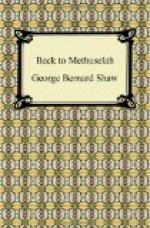The lieutenants of God are not always persons: some of them are legal and parliamentary fictions. One of them is Public Opinion. The pre-Darwinian statesmen and publicists were not restrained directly by God; but they restrained themselves by setting up an image of a Public Opinion which would not tolerate any attempt to tamper with British liberties. Their favorite way of putting it was that any Government which proposed such and such an infringement of such and such a British liberty would be hurled from office in a week. This was not true: there was no such public opinion, no limit to what the British people would put up with in the abstract, and no hardship short of immediate and sudden starvation that it would not and did not put up with in the concrete. But this very helplessness of the people had forced their rulers to pretend that they were not helpless, and that the certainty of a sturdy and unconquerable popular resistance forbade any trifling with Magna Carta or the Petition of Rights or the authority of parliament. Now the reality behind this fiction was the divine sense that liberty is a need vital to human growth. Accordingly, though it was difficult enough to effect a political reform, yet, once parliament had passed it, its wildest opponent had no hope that the Government would cancel it, or shelve it, or be bought off from executing it. From Walpole to Campbell-Bannerman there was no Prime Minister to whom such renagueing or trafficking would ever have occurred, though there were plenty who employed corruption unsparingly to procure the votes of members of parliament for their policy.
POLITICAL OPPORTUNISM IN EXCELSIS
The moment Nobodaddy was slain by Darwin, Public Opinion, as divine deputy, lost its sanctity. Politicians no longer told themselves that the British public would never suffer this or that: they allowed themselves to know that for their own personal purposes, which are limited to their ten or twenty years on the front benches in parliament, the British public can be humbugged and coerced into believing and suffering everything that it pays to impose on them, and that any false excuse for an unpopular step will serve if it can be kept in countenance for a fortnight: that is, until the terms of the excuse are forgotten. The people, untaught or mistaught, are so ignorant and incapable politically that this in itself would




